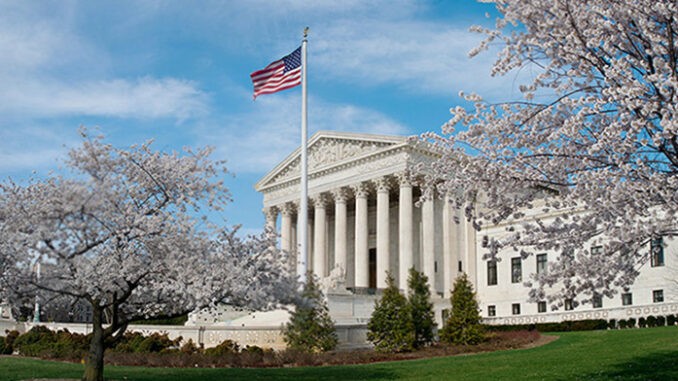
WASHINGTON – Attorneys with the Arizona-based Alliance Defending Freedom, representing a Michigan funeral home in a pivotal case before the U.S. Supreme Court filed a brief Friday asking the court to affirm that judges and government agencies can’t usurp the role of Congress by redefining the word “sex” in federal law to mean “gender identity.”
In April, the high court agreed to take the case and two others raising related issues. As the ADF brief argues, allowing courts and agencies to redefine the law “will cause problems in employment law, reduce bodily-privacy protections for everyone, and erode equal opportunities for women and girls, among many other consequences.”
 The U.S. Court of Appeals for the 6th Circuit ruled that the federal government can force R.G. & G.R. Harris Funeral Homes and its owner, Thomas Rost, to allow a male funeral director who identifies as female to dress and present as a woman when meeting with grieving families. The court ruled against the funeral home even though what the employee proposed to do violated the family business’s sex-specific dress code, which the employee agreed to when hired and abided by for nearly six years. The court’s decision redefined “sex” in Title VII to conflict with the word’s well-understood meaning since the law’s enactment in 1964. Title VII is a federal law intended to ensure equal opportunities in employment, regardless of a person’s race, color, religion, national origin, or sex.
The U.S. Court of Appeals for the 6th Circuit ruled that the federal government can force R.G. & G.R. Harris Funeral Homes and its owner, Thomas Rost, to allow a male funeral director who identifies as female to dress and present as a woman when meeting with grieving families. The court ruled against the funeral home even though what the employee proposed to do violated the family business’s sex-specific dress code, which the employee agreed to when hired and abided by for nearly six years. The court’s decision redefined “sex” in Title VII to conflict with the word’s well-understood meaning since the law’s enactment in 1964. Title VII is a federal law intended to ensure equal opportunities in employment, regardless of a person’s race, color, religion, national origin, or sex.
Allowing this decision to stand would have ramifications for other laws, such as Title IX, which ensures equal opportunities in education and athletics for women and girls who are already being marginalized by local governments that are allowing boys who identify as girls to compete in girls’ sports. In Connecticut, two boys who identify as girls have recently won 15 girls’ state track-and-field titles, which nine different girls held in 2016.
“Americans should be able to rely on what the law says. Redefining ‘sex’ to mean ‘gender identity’ creates chaos, is unfair to women and girls, and puts employers in difficult situations,” said ADF Vice President of Appellate Advocacy John Bursch, who served as Michigan’s solicitor general from 2011-13. “Title VII and other civil rights laws, like Title IX, are in place to protect equal opportunities for women; changing ‘sex’ to mean ‘gender identity’ undermines that.”
“The employee in this case testified that employers must treat male employees who believe themselves to be women as if they are women unless they don’t ‘meet the expectations’ of what women ‘[t]ypically’ look like,” Bursch added. “This is an impossible standard and forces employers to engage in the very stereotypes the law is supposed to condemn.”
In 2016, the U.S. District Court for the Eastern District of Michigan ruled in favor of the funeral home. The federal Equal Employment Opportunity Commission sued over the funeral home’s decision to apply its dress code to the employee, who insisted on violating that policy despite having agreed to it and followed it for years. Although the federal government now agrees with the funeral home, the American Civil Liberties Union is arguing on behalf of the former employee that the Supreme Court should rewrite the law.
As explained in the brief filed with the U.S. Supreme Court in R.G. & G.R. Harris Funeral Homes v. Equal Employment Opportunity Commission, “judicially rewriting sex discrimination in Title VII will spill over into other federal laws that prohibit sex discrimination. It will deny women and girls fair opportunities to compete in sports, to ascend to the winner’s podium, and to receive critical scholarships. It will also require domestic-abuse shelters to allow men to sleep in the same room as female survivors of rape and violence. And it may dictate that doctors and hospitals provide transition services even in violation of their religious beliefs.”
“In sum, elected legislative- and executive-branch officials should carefully consider everyone’s interests when changing nondiscrimination legislation,” the brief continues. “Courts are the branch least equipped to do so. This Court should reverse the Sixth Circuit’s reimagining of Title VII and direct that judgment be entered for Harris.”
“Harris Funeral Homes should be free to rely on what the law says and focus on serving grieving families without fear of unjust government punishment,” said ADF Senior Counsel Kate Anderson. “Unelected officials outside the legislature don’t have the power to rewrite the law.”
